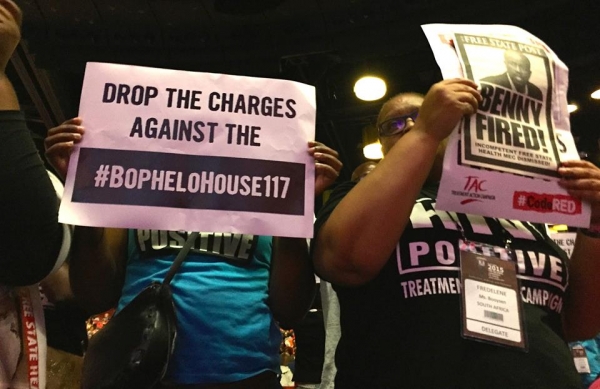

TAC members protest at the South African AIDS Conference in 2015. Archive photo from Facebook.
18 February 2020
The criminal records of 94 community health workers and members of the Treatment Action Campaign (TAC), who were arrested at a night vigil outside the Free State Department of Health in 2014 have been cleared, according to SECTION27.
The vigil in June 2014 was a protest against the condition of the Free State public healthcare system and the decision by then MEC for Health Benny Malakoane to dismiss approximately 3,000 community health workers in the province.
The protesters, known as the #BopheloHouse94, were arrested for attending a gathering under the Regulation of Gatherings Act 205 of 1993 and were convicted and sentenced in October 2015.
The matter was taken on appeal to the Free State High Court where the court ruled that attending a gathering for which no notice had been given did not constitute a prohibited gathering in terms of the Act. Convictions and sentences were set aside on 17 November 2016.
“The judgment reaffirmed the centrality of the right to freedom of assembly in our constitutional democracy and its purpose - to give voice to the powerless,” read the statement released by SECTION27 on 18 February.
But, SECTION27 said, though the court had set aside the convictions, the #BopheloHouse94 still had criminal records for over three years.
“This failure of the system caused them to suffer indignity and presented unjustified hurdles in their everyday lives. The #BopheloHouse94 have been sent from pillar to post for the past three years, incurring significant costs, in attempts to have the criminal records removed. It has taken a herculean effort from SECTION27 and TAC to ensure that the records are finally cleared,” read the statement.
Tendai Mafuma, legal researcher at SECTION27, said the organisation was concerned about the lack of coordination between the court and South African Police Service Criminal Records Centre.
“How many other people, following acquittal, remain with criminal records? There is a need for clarity and for the establishment of processes to clear criminal records in the case of acquittal to allow those acquitted of crimes to continue with their lives unhindered by incorrect criminal records,” he said.